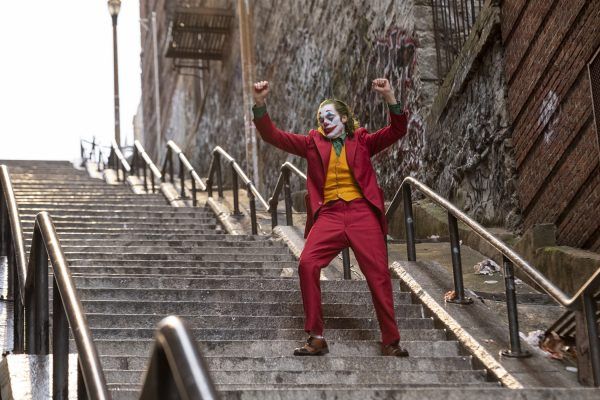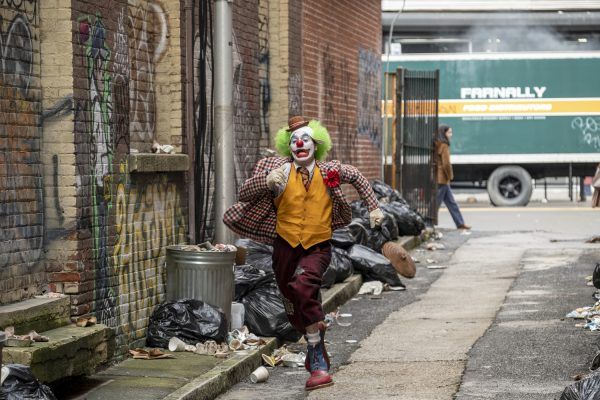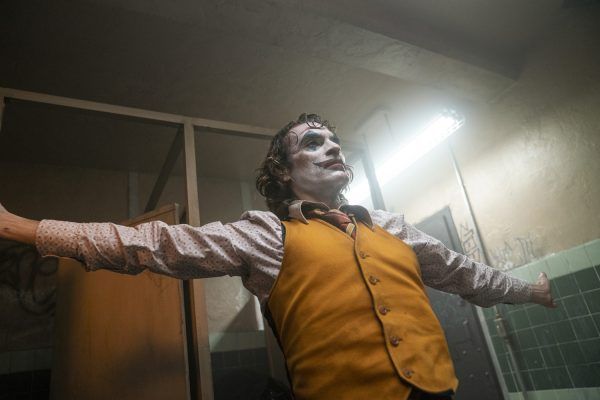*Major spoilers for Joker below*
Probably the biggest punchline Joker pulls off is the fact that it's overwhelmingly fine. Todd Phillips' take on Batman's most clownish foe doesn't believe in enough to inspire the real-world craziness we feared in the lead-up—unless you count that eight-minute standing ovation at Venice, which is absolute insanity—but it does feature a violently-committed, Oscar-worthy lead performance from Joaquin Phoenix, a haunting string-heavy score by Hildur Guðnadóttir, and at least one brief shot of some super rats, and ya just can't go wrong with some super rats. Like any controversial joke, it's split the good folks here at Collider all willy-nilly; as of this writing, we've got not just one but two video raves, a written "meh", and a tentative "game-changer, all to the tune of the movie breaking box office records. Shallow as a rain-puddle and occasionally dumb to boot, Joker and the stir it's whipped up is at least worth discussing. So it's a shame that it also takes place in one of the most boring versions of Gotham City ever put to page or screen.
Both Todd Phillips and Joaquin Phoenix would tell you again and again (and again) that Joker ain't no comic book movie, it's a serious adult drama, and Batman isn't a character outside of young Bruce Wayne watching a mentally ill man visit Wayne Manor and then, later, a clown-masked thug murdering his parents. But the problem with that presentation is the fact that...Joker is a comic book movie and a Batman story. Remove the history of the character and it's even flimsier of a story than it already is. The Dark Knight isn't present in Joker but Gotham City very much is, and I'd argue Gotham City is just as important to the Batman mythos as Martha Wayne's pearl necklace Warner Bros. is contractually obligated to show at least once a year or it folds as a company. It's from the mad muck and rot embedded in the foundations of Gotham that a man dressed in a military-grade bat costume becomes a hero. Batman and his Rogues Gallery could not exist anywhere else.
I'd also argue that Gotham City is essential to the idea of the Joker. Any chiroptologist worth their salt could let you know that the natural enemy of the bat is not a circus clown. That's science, baby. But Joker is Batman's greatest foe for a reason; the man who laughs with a switchblade in his hand is emblematic of Gotham City's sickness, an undeniable, undefinable thing that imbues chaos into brick and stone. Bruce Wayne's mission to save Gotham is ultimately a noble futility because it's a city with a bedrock of lunacy, a place where the white face of a homicidal circus clown will keep laughing from the shadows no matter how many times he sinks a fist into it.
Phillips and cinematographer Lawrence Sher reduce Gotham City to its barest form of trash heaps and cracked sidewalks. In an effort to ape the best of Martin Scorsese flicks like Taxi Driver and The King of Comedy, Joker's Gotham, at its best, could be any city in the world; at its worst, it is quite literally just New York at some point in the 1980s. Either way, Phillips and Sher artfully compose their city but there's nothing to the vision but dirt and anger, and the result is a movie desperately trying to distance itself from the comic book history that is also the only reason it exists in the first place.
It's not just a visual thing, either. Not every Gotham City can be the art-deco theme park of Tim Burton, the neo-noir dreamscape of Batman: The Animated Series, or the LSD warehouse rave of those Joel Schumacher films. In Christopher Nolan's Dark Knight trilogy, Gotham City is pretty notably just a city on the surface. But Nolan knew that if he wanted to introduce an agent of chaos he had to give the city a personality; he had to give the city a choice. One of the most misunderstood aspects of The Dark Knight is this idea Heath Ledger's Joker has an ideology that stands up in any way. Yes, it's Super Cool to say you don't believe in anything and identify as "a dog chasing cars" in a Twitter bio. But the most compelling characters in that movie are the nameless Gotham City residents on those two ferries—one filled with citizens, the other prisoners—who separately decide not to blow up the other. These are people who live in an obviously heightened reality in which a clown-themed terrorist might turn you to dust on your commute home, and yet still choose the path to humanity. It's the choice at the center of every Batman character, riding that thin line between insanity and heroism.
Contrast that with Joker's Gotham City, a place that only exists on one side of that line. This Gotham City is apparently made up solely of a cartoonishly evil upper crust filled with Wall Street douchebags who know every word to Stephen Sondheim's "Send in the Clowns" and a repressed lower class willing to immediately throw violent support behind a psycho who commits murder on live TV. Joker's vague commitment to "civil unrest" is the same as its portrayal of mental illness: things are cuh-raaaazy for craziness' sake.
Of course, the "explanation" offered by the film's ending is that all we see is the unreliable—some might say tWiStEd—vision of the Joker himself, talking to a therapist in a mental asylum. The movie even borrows a line still thrown around by comment-section trolls with Rorschach profile photos: "You wouldn't get it." But it's really not that deep. Joker is just a movie that wants so badly not to be a comic book movie, and it puts that want right up on a screen in a Gotham City stripped of all the things that gives it any character. But then it also goes ahead and kills Bruce Wayne's parents in an alleyway—THE comic book moment of comic book moments—and asks us to believe a billionaire will become a bat in this reality. And that, admittedly, is pretty funny.




